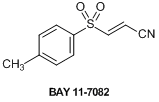NF-κB (nuclear factor kappa B) is an intracellular protein complex that controls gene transcription, which was identified by D. Baltimore et al. in 1986.1) NF-κB is usually sequestered in the cytoplasm by forming an inactivated complex with IκB (Inhibitor κB). IKK (IκB kinase) activated by extracellular signals phosphorylates IκBα, and then the proteasome degrades phosphorylated IκBα. Then NF-κB can translocate into the nucleus and induce the expression of genes encoding molecules related to inflammatory immune response, apoptosis-suppressing molecules, cytostatic molecules, etc.2)
BAY 11-7082 is a small molecule inhibiting the phosphorylation of IκBα by IKK.3) It has been reported to use BAY 11-7082 as a NF-κB inhibitor in research of cancer, inflammation, viral infection and so on.4-7)
Published TCIMAIL newest issue No.200 | Product Document Searching Made Easy by 2D Code! | TCI Life Science News December 2025 | [Product Highlights] Cell Culture-Ready Antibiotic... | Various analytical charts can be searched on each product detail page and Product Document Search (The kinds of analytical charts differ by product)
